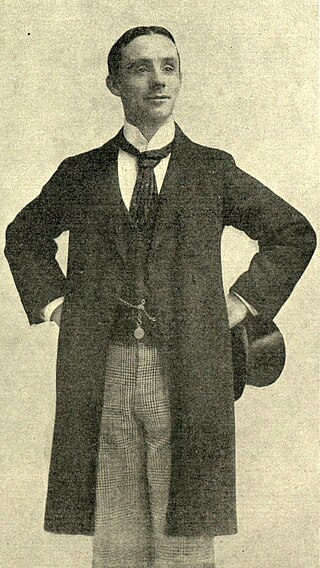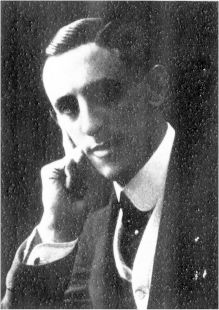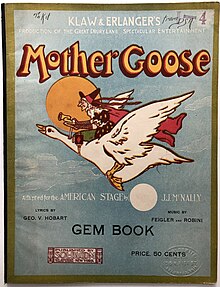
Mother Goose is a character that originated in children's fiction, as the imaginary author of a collection of French fairy tales and later of English nursery rhymes. She also appeared in a song, the first stanza of which often functions now as a nursery rhyme. The character also appears in a pantomime tracing its roots to 1806.

Jean Schwartz was a Hungarian-born Jewish American composer and pianist. He is best known for his work writing the scores for more than 30 Broadway musicals, and for his creation of more than 1,000 popular songs with the lyricist William Jerome. Schwartz and Jerome also performed together on the vaudeville stage in the United States; sometimes in collaboration with Maude Nugent, Jerome's wife, and the Dolly Sisters. Schwartz was married to Jenny Dolly from 1913-1921.

George Wild Galvin, better known by the stage name Dan Leno, was a leading English music hall comedian and musical theatre actor during the late Victorian era. He was best known, aside from his music hall act, for his dame roles in the annual pantomimes that were popular at London's Theatre Royal, Drury Lane, from 1888 to 1904.

A pantomime dame is a traditional role in British pantomime. It is part of the theatrical tradition of travesti portrayal of female characters by male actors in drag. Dame characters are often played either in an extremely camp style, or else by men acting butch in women's clothing. They usually wear heavy make up and big hair, have exaggerated physical features, and perform in an over-the-top style.
Mr Cinders is a 1928 musical with music by Vivian Ellis and Richard Myers and a libretto by Clifford Grey and Greatrex Newman. The story is an inversion of the Cinderella fairy tale with the gender roles reversed. The Prince Charming character has become a modern (1928) young and forceful woman, and Mr Cinders is a menial.

Paul Alfred Rubens was an English songwriter and librettist who wrote some of the most popular Edwardian musical comedies of the early twentieth century. He contributed to the success of dozens of musicals.

Ellen Sophia Taylor, known professionally as Sybil Grey, was a British singer and actress during the Victorian era best known for creating a series of minor roles in productions by the D'Oyly Carte Opera Company, including roles in several of the famous Gilbert and Sullivan operas, from 1880 to 1888. Afterwards, she went on to a long West End theatre career, appearing in both musical theatre and plays.

Frederick John D'Auban was an English dancer, choreographer and actor of the Victorian and Edwardian eras. Famous during his lifetime as the ballet-master at the Theatre Royal, Drury Lane, he is best remembered as the choreographer of many of the Gilbert and Sullivan operas.

Dan Leno was an English comedian and stage actor of the Victorian and Edwardian eras, famous for performing in music hall. As a child, he was known for his clog dancing, and in his teen years, he became the star of his family's music hall act throughout Britain. He was an increasingly popular solo artist during the late 1880s and 1890s. He also performed in pantomimes and a few Victorian burlesques and comic plays and musicals, especially in the last two decades of his career.

Dorothy Ward was an English actress who specialised in pantomimes, playing the principal boy roles, while her husband Shaun Glenville would play the dame roles. She had a successful 52 year career and played in over 40 pantomimes between 1905 and 1957.

Madge Lessing was a British stage actress and singer, panto principal boy and postcard beauty of Edwardian musical comedy who had a successful career in the West End in London, Europe and on Broadway from 1890 to 1921 and who made a number of early film appearances in Germany for director Max Mack.

Kitty Loftus was an English dancer, singer and actor-manager. A leading soubrette of the 1890s and 1900s in comedies, burlesque, pantomime and musical plays, at the height of her career she performed with her Kitty Loftus Company. One critic praised her as "a tricky sprite and a fantastic elf." In her last years, she performed in variety in music halls and on tour.

The Prince's Theatre was a theatre on Park Row in Bristol in England which was built in 1867 and was destroyed by bombing in 1940 in the Bristol Blitz during World War II. Owned by members of the Chute family for most of its existence, at one time the theatre was the Bristol venue for many of the country's leading touring actors and theatrical companies in addition to being one of the most renowned pantomime houses in the country before briefly becoming a music hall and latterly a cinema. The actors Henry Irving and Ellen Terry made their last appearance together under Irving's management at the Prince's Theatre in The Merchant of Venice in 1902.

Aubrey Hopwood was a British lyricist of Edwardian musical comedy and a novelist and author of nonsense books for children. He co-wrote the lyrics for the musicals Alice in Wonderland (1886), A Runaway Girl (1898) and The Lucky Star (1899), among others.
Little Red Riding Hood is a musical in two acts with lyrics by Harrison Ward and music by composers Edward E. Rice, Fred J. Eustis, Charles Dennée, T. W. Connor, and B. Gilbert. The musical's book was authored by playwright George T. Richardson and was loosely modeled after British pantomime versions of the classic European fairy tale of the same name. It also included characters from other classic fairy tales. It premiered on Christmas Eve 1899 at the Boston Museum, and then ran for further performances in Boston in January 1900 at the Hollis Street Theatre before transferring to Broadway.
Frederick J. Eustis, sometime referred to as F. J. Eustis, was an American composer, conductor, and theatre director. He is best remembered for writing music for several Broadway musicals.
John J. McNally was an American playwright, journalist, and drama critic. As a playwright he is best known for penning the books for many Broadway musicals staged between the years 1895–1909. Many of these were crafted for the Rogers Brothers, or were created in collaboration with the songwriting team of Jean Schwartz and William Jerome. He was a longtime drama critic and editor for various Boston newspapers.
Jay Hickory Wood was an English playwright, novelist, and biographer. Born in Manchester, he was best known as the author of many pantomimes; several of them written in collaboration with Arthur Collins. His first pantomime performed in London's West End was Puss'n Boots at the Garrick Theatre in 1899. He wrote new pantomimes for the Theatre Royal, Drury Lane, in 13 consecutive seasons. Several of these were adapted into musicals produced on Broadway by Klaw and Erlanger, including The Sleeping Beauty and the Beast (1901) and Mother Goose (1903).

The Sleeping Beauty and the Beast is a musical in three acts with music by J. M. Glover and Frederick Solomon and lyrics by J. Cheever Goodwin. It's book by John J. McNally and Goodwin was adapted from the Theatre Royal, Drury Lane's 1900 pantomime of the same name by J. Hickory Wood and Arthur Collins. The musical also included additional music and lyrics by the song writing team of Jean Schwartz and William Jerome, and by the African-American creative team of Bob Cole, James Weldon Johnson, and J. Rosamond Johnson.

Harry Bulger was an American actor and comedian known for his performances in musicals and in vaudeville from the 1890s through the 1920s. A long time stage partner of Sherrie Matthews, he was one half of the vaudeville duo Matthews and Bulger.















